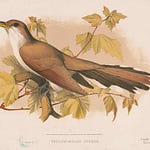As our Poem of the Week today, I decided to offer, from my own translation, the first 27 lines of Dante’s Purgatory, my favorite of the three parts of the Divine Comedy.
I’ve often thought that Italian — I mean the Tuscan dialect, now standard in schools across the nation — is the most beautiful language I know of. Its vowels are pure and bright, its consonants crisp and distinct. It has both of the liquids, L and R, always a good thing; and though it allows for a wider variety of consonant clusters at the beginning of words than English does, it doesn’t allow them so much to pile up at the end, and in any case a vowel usually follows them, and it is really pronounced and isn’t just an ‘uh,’ and it conveys real meaning. So when you have the great Dante describing something serene and beautiful in Italian, you’ve got something.
Listen to this line: Dolce color d’oriental zaffiro. A lot of liquids there, for sure! Dolce color d’oriental zaffiro — what does it mean? Dante the pilgrim has just climbed out of the underworld with his guide, Virgil. They have spent the better part of three days down there, and when they leave the place and come out again into the open air, it is early in the morning, just before the sunrise, on Easter Sunday. He’s been reborn, you might say. During all that time in what he calls the “dead air,” he had not once seen the blue skies above. But now he does see them, and the beautiful planet Venus, here shining as the Morning Star, and Dante notes it well, because Venus is the mythical goddess of love.
There is no true love in hell, of course, and not really all that much energy of any kind, but now, in the world again, standing on the good solid earth and looking up to the stars, Dante feels the influence of love showering down upon him. And he describes the color of the sky: Dolce color d’oriental zaffiro: Sweet color of oriental sapphire. In my translation of these lines, I’ve taken the cue from the inner meaning of the word oriental: it has to do with rising, just as occidental has to do with setting. So we aren’t talking about China or India here. We’re talking about the rising sun, and resurrection. My translation: Sweet sapphire of the morning in the east
I mentioned earlier this week, when I was talking about the word blue, that it’s the most natural thing in the world, when people go outdoors at the beginning of their day, to look up at the sky. Dante, of course, has a lot of reasons to do so — as I’ve said, being deprived of the skies for even a few days is, well, a hell of a thing to endure. But there’s one sort of person who had to look at the skies all the time, to reckon by the stars and the planets, the sun and the moon. That was the man at the helm of a ship. But we are all at sea, aren’t we? We orient ourselves by the divine. Our own little ships of ingenuity won’t get us far unless we are guided and protected from above. Gone is all worry from Dante’s heart. These are better waters, he says, and this realm is a gift to man. What it will be like, we don’t yet know, because we’re still with the pilgrim poet at the base of the mountain. But the skies give us good hope — and their sweet sapphire of the morning in the east.
My little ship of ingenuity now hoists her sails to speed through better waters, leaving behind so pitiless a sea, And I will sing about that second realm given the human soul to purge its sin and grow worthy to climb to Paradise. Here rise to life again, dead poetry! Let it, O holy Muses, for I am yours, and here, Calliope, strike a higher key, Accompanying my song with that sweet air which made the wretched Magpies feel a blow that turned all hope of pardon to despair. Sweet sapphire of the morning in the east, gathering in the starlit face of heaven, pure from the zenith to the nearest ring, Renewed my joy in looking on the skies as soon as I had come from the dead air that had saddened my heart and dimmed my eyes. The radiant Planet fostering love like rain made all the orient heavens laugh with light, veiling the starry Fishes in her train. I turned to the right hand, and set my mind to scan the southern pole, and saw four stars no one has looked on since the first mankind. The heavens seemed delighted in their flame! O widowed region of the northern stars, you who have been deprived the sight of them!
© Anthony Esolen, Dante’s Divine Comedy: Purgatory (Modern Library), 2004.
Word & Song is an online magazine devoted to reclaiming the good, the beautiful, and the true. We publish six essays each week, on words, classic hymn, poems, films, and popular songs, as well a weekly podcast, alternately Poetry Aloud or Anthony Esolen Speaks. To support this project, please join us as a free or paid subscriber.














Share this post